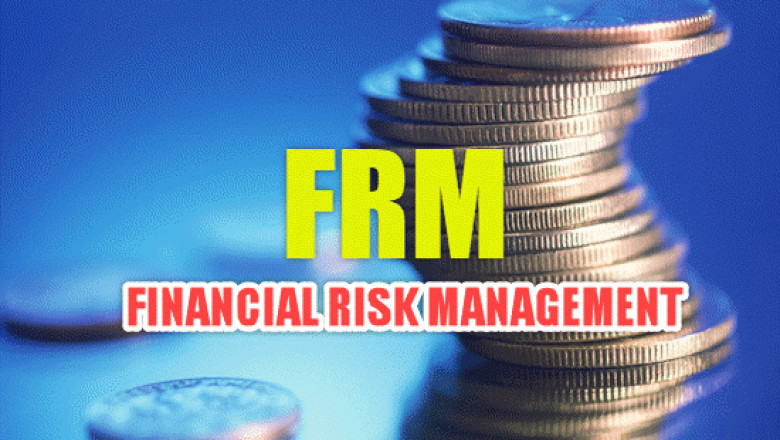views
In a world characterized by constant economic fluctuations and an increasingly complex financial landscape, businesses face numerous challenges when it comes to managing their financial health. One of the most formidable threats is financial risk, which can take many forms, including market volatility, credit risk, and operational uncertainties. To navigate these challenges, businesses are increasingly turning to experts known as Financial Risk Managers (FRMs). This article delves into why hiring a Financial Risk Manager is crucial for protecting business assets and how their expertise can safeguard the financial stability of an organization.
The Role of a Financial Risk Manager
A Financial Risk Manager is a professional who specializes in identifying, assessing, and mitigating financial risks that can threaten the assets and operations of a business. These experts employ a range of analytical tools and methodologies to evaluate potential risks, develop strategies to mitigate them, and ensure the financial robustness of the organization. Their primary goal is to protect and enhance the value of business assets, thereby securing the long-term success of the entity.
Expertise in Risk Assessment
Financial Risk Managers possess a deep understanding of financial markets and instruments. They are well-versed in analyzing macroeconomic trends, market behaviors, and financial data to anticipate potential risks. By recognizing vulnerabilities, such as exposure to volatile currency exchange rates or shifts in interest rates, they can devise strategies that minimize adverse impacts on the business. This proactive approach to risk management is instrumental in preserving business assets against unforeseen financial turbulence.
Strategic Planning and Implementation
One of the key benefits of hiring a Financial Risk Manager is their ability to strategize and implement risk management plans. They work closely with the leadership team to develop comprehensive risk management frameworks tailored to the specific needs of the business. These frameworks typically include policies and procedures for risk identification, assessment, and monitoring. By integrating risk management into the broader strategic planning process, Financial Risk Managers ensure that potential threats are considered in decision-making, paving the way for sustainable growth.
Safeguarding Against Credit Risks
Credit risk is one of the most common financial risks businesses face. It arises when there is a possibility of a counterparty defaulting on its obligations. Financial Risk Managers play a crucial role in evaluating the creditworthiness of clients, partners, and suppliers. By employing quantitative techniques and financial models, they can assess the probability of default and the potential impact on the business. This insight enables companies to make informed decisions about extending credit, thereby protecting assets from potential losses due to default.
Market Risk Mitigation
Market risk, driven by fluctuations in asset prices, interest rates, and foreign exchange rates, can significantly impact a business’s financial position. Financial Risk Managers employ sophisticated techniques, such as Value at Risk (VaR) analysis and stress testing, to quantify and mitigate market risks. By doing so, they help businesses develop hedging strategies to protect themselves against adverse market movements. This proactive approach ensures that businesses remain resilient even in volatile market conditions, safeguarding their financial assets.
Operational Risk Management
Apart from financial markets, businesses also face risks associated with their daily operations. These can range from technology failures and cyber threats to supply chain disruptions and regulatory compliance issues. Financial Risk Managers are adept at identifying operational risks and devising strategies to mitigate them. This includes implementing robust internal controls, developing disaster recovery plans, and ensuring compliance with industry regulations. By addressing operational risks, these professionals help businesses avoid costly disruptions and potential financial losses.
Synergy with Chartered Financial Analysts (CFA)
While Financial Risk Managers focus primarily on identifying and managing risks, they often collaborate with Chartered Financial Analyst (CFA) to gain deeper insights into financial markets and investment strategies. CFAs bring expertise in asset valuation, investment analysis, and portfolio management, complementing the risk-focused approach of Financial Risk Managers. This collaboration enhances a business’s ability to make informed investment decisions while effectively managing risks, ensuring that assets are safeguarded and optimized for growth.
Enhancing Stakeholder Confidence
The appointment of a Financial Risk Manager sends a strong signal to stakeholders, including investors, regulators, and customers, that the business is committed to financial prudence and asset protection. Investors are more likely to have confidence in a company that actively manages financial risks, as it demonstrates the organization’s dedication to preserving shareholder value. Additionally, by ensuring compliance with regulatory requirements, businesses can avoid legal penalties and reputational damage, further bolstering stakeholder confidence.
Adapting to Evolving Risk Landscapes
In today’s rapidly evolving world, businesses must contend with an ever-changing risk landscape. Economic uncertainties, geopolitical tensions, environmental challenges, and technological advancements all contribute to the dynamic nature of financial risks. Financial Risk Managers stay abreast of these developments, continuously adapting risk management strategies to address emerging threats. Their ability to anticipate and navigate evolving risks ensures that businesses remain resilient and agile in the face of adversity.
Conclusion:
In conclusion, hiring a Financial Risk Manager is a prudent decision for any business looking to protect its assets and secure its financial future. These professionals bring a wealth of knowledge and expertise in risk assessment, strategic planning, and operational resilience. By effectively managing financial risks, they safeguard business assets against market fluctuations, credit defaults, and operational disruptions. Moreover, their collaboration with Chartered Financial Analysts further strengthens investment strategies and enhances asset protection. Ultimately, the role of a Financial Risk Manager is not just about minimizing risks, but also about empowering businesses to thrive in an unpredictable world. As businesses continue to navigate the complexities of modern finance, the value of having a skilled FRM on board cannot be overstated.














Comments
0 comment